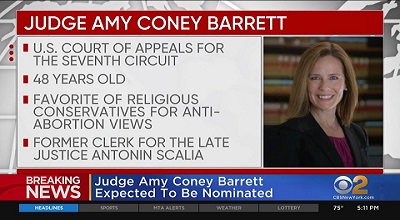Letter From Committee on Justice Regarding Amy Coney Barrett to the Supreme Court

Dear Chairman Graham and Ranking Member Feinstein,
We, the president and public policy director of the Committee for Justice (CFJ), write to you regarding the nomination of Amy Coney Barrett to be an Associate Justice of the United States Supreme Court. Founded in 2002, CFJ is a nonprofit legal and policy organization that promotes the rule of law and constitutionally limited government. We strongly urge you to support the nomination of Judge Amy Coney Barrett.
Judge Barrett is an accomplished woman whose record is, without question, worthy of this nomination. She was the Executive Editor of the Notre Dame Law Review. She was the recipient of the Hoynes Prize (for the best record in scholarship, deportment, and achievement), and the Dean’s Award (for the best exam in Administrative Law, Civil Procedure, Constitutional Law, Contracts, Criminal Procedure, Evidence, First Amendment, Torts, and Legal Research and Writing).
After graduating as class valedictorian, Judge Barrett continued her path of excellence, earning multiple prestigious judicial clerkships. First, under Judge Laurence Silberman of the U.S. Court of Appeals for the D.C. Circuit, and later under the late, legendary Supreme Court Justice Antonin Scalia. When she was nominated to the U.S. Court of Appeals for the Seventh Circuit each of Judge Barrett’s fellow Supreme Court clerks from the class of 1998—including every liberal clerk signed a letter touting her record and qualifications.
She was a Professor of Law and the Diane and M.O. Miller II Research Chair in Law at the Notre Dame Law School in South Bend, Indiana, where she won the “Distinguished Professor of the Year” award multiple times. Subsequently, she was confirmed to the Seventh Circuit following a bipartisan vote.
 Judge Barrett is even more impressive in her character and personal life. A woman of deep faith and integrity, Judge Barrett is an inspiration to millions of women across the country. She is the wife to a supportive husband who shares the love of the law, as a notable attorney himself. She is the mother of seven, who has also experienced the challenges of a child with special needs. She would be the first mother with school-aged children to serve as a justice. As Justice Sotomayor remarked that her experience as a wise Latina would bring richness of experience, so will Judge Barrett’s diversity of life experience greatly benefit the Court.
Judge Barrett is even more impressive in her character and personal life. A woman of deep faith and integrity, Judge Barrett is an inspiration to millions of women across the country. She is the wife to a supportive husband who shares the love of the law, as a notable attorney himself. She is the mother of seven, who has also experienced the challenges of a child with special needs. She would be the first mother with school-aged children to serve as a justice. As Justice Sotomayor remarked that her experience as a wise Latina would bring richness of experience, so will Judge Barrett’s diversity of life experience greatly benefit the Court.
Committee approval and Senate confirmation of Judge Barrett’s nomination before the election is imperative. History shows abundant evidence of quick confirmations. Justice Ginsburg herself was confirmed 42 days after she was nominated. Justice Sandra Day O’Connor’s confirmation took 33 days, while Justice John Paul Stevens was confirmed 19 days after being nominated. A more recent example is Chief Justice Roberts’ nomination length as Chief Justice of 23 days. Historical precedent is also on the side of filling the seat. When the same party controls the White House and the Senate, the confirmation process proceeds as usual and the nominee is almost always confirmed. A new justice has been confirmed 8 out of 10 times this has happened.
A full bench of nine justices is crucial to decide cases in the upcoming term. If a four to four split occurs, lower court rulings will be affirmed, or cases need to be reargued. The Supreme Court will be unable to fulfill one of its most important duties in saying what the law is. This is not the best use of the people’s judicial resources. Judge Barrett must be confirmed before the election so the Supreme Court can fulfill its duties as the highest court in the land.
Judge Barrett remarked on Justice Scalia’s influence on her, “a judge must apply the law as written, not as the judge wishes it were. Sometimes that approach means reaching results the judge does not like, but this is what it means to say we have a government of laws, not of men.” These textualist values were demonstrated in her opening statement, where she explained how she writes opinions from one of her children’s perspective as the party she is ruling against. Even if she did not like the result, would the decision be fairly reasoned and grounded in law? Fidelity to the law means fidelity to the text as it is written. Senator Lee explained that Judge Barrett is not being reviewed for a legislative position or policymaking position. She is being reviewed for a position on our nation’s highest court – where she will be asked to decide cases based on the law, based on the facts. Senator Sasse’s civics lesson was an excellent reminder of what the hearing should be about and the common values we should prioritize.
For these reasons and more, we urge you to ensure this nomination process is administered without delay. Every senator should be proud to vote in favor of a woman like Judge Amy Coney Barrett to the United States Supreme Court.
Sincerely,
Curt Levey
President
Ashley Baker
Director of Public Policy


